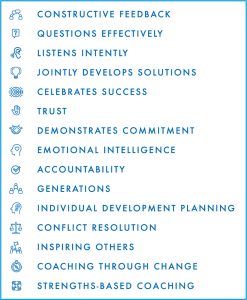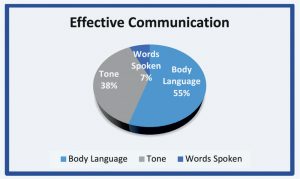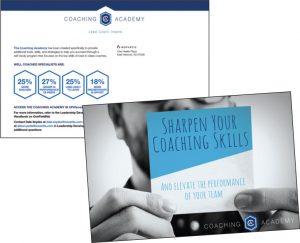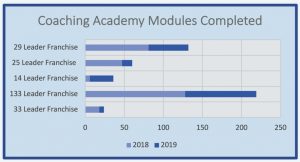Novartis: Creating a Coaching Culture for Leaders
Cover Story – By Alison Pulte, Dale Snyder, Tyler Kunkel and Mark Osborne
Improving leaders’ ability to coach their teams increases engagement and drives development

Participants celebrate the end of core training, the second course in Novartis training series, with a little humor. From left, Bobby Panfili, Bryan Richardson, Angella King, Cary Sadowski, Steven Hoyt, Tyler Kunkel, Peter Lyon, Alison Pulte, Donald Dean and John Resnick.
Research has shown that coaching is the No. 1 activity to improve sales effectiveness. There is further evidence to support that improving leaders’ ability to coach their teams increases engagement and drives development while improving performance and retention.
At Novartis, new-to-role first-line leaders attend three leadership workshops over the course of 12 to 18 months, all of which prioritize coaching. The first course introduces them to our coaching process, including roleplay simulations with live actors. This is followed up with biweekly calls to reinforce the coaching process by discussing real-world application with their new teams.
 The second training layers in crucial conversations and more difficult coaching roleplay scenarios. The final course is an advanced leadership training, where we dive deep into servant leadership, leadership philosophy and accountability.
The second training layers in crucial conversations and more difficult coaching roleplay scenarios. The final course is an advanced leadership training, where we dive deep into servant leadership, leadership philosophy and accountability.
Confident in the new-to-role coaching curriculum, we recognized there were not a broad range of internal resources available to support the continuous development of coaching skills. This led to the development of the Coaching Academy, a series of elective, self-directed learning modules based on the needs identified by field leadership and aligned to our coaching process.
Approaches & Key Actions
Leveraging the “Six Disciplines of Breakthrough Learning” (6Ds), a thorough gap analysis was conducted to identify and prioritize content. The gap analysis was designed to identify the high-priority skills for on-the-job effectiveness where leaders had a lack of confidence in their ability. We collaborated with a cross-functional team consisting of field sales leaders, human resources, legal, our field leadership advisory board spanning all six franchises and our internal training team.
Throughout the development of each Coaching Academy module, we continuously tapped into our advisory board of 14 first-line leaders to seek feedback on the content, design and development of each module.
The modules follow a Learn, Reflect, Apply, Teach sequence to create a lasting development experience, allowing time to grasp the learnings as well as apply the newly learned concepts in the field. The focus on in-role application provides alignment with the 70-20-10 principle of development.
The learner is also required to teach back to their peers and share their expertise, which elevates the skills of the peer group and reinforces the learner’s experience.
 This approach has been well received by the leaders at Novartis.
This approach has been well received by the leaders at Novartis.
“This is a great resource and I love the structure of reading the material, applying it in the field, role-playing with our regional directors and then teaching it to our peers,” said one area business leader.
These elective modules can be completed in any order, at any time, based on the individual’s developmental plan. A two-page coaching skills diagnostic tool was designed to facilitate a coaching development discussion between the director and manager to determine module prioritization.
We leveraged all available technologies, allowing modules to be accessed via laptop, tablet or smart phone. Each module also contains a wealth of additional resources including articles, books, TED Talks and suggestions for external and internal courses allowing the learner to delve deeper into a topic if so desired.
One challenge continually posed by senior leadership is to provide opportunities for second-line leaders to observe their first-line leaders coaching. The Coaching Academy was specifically designed to engage the second-line sales leader (regional director) as a coach of coaches. Video conferencing technology is leveraged to allow the director to provide feedback on both the verbal and nonverbal aspects of coaching.
“Leveraging the coaching scenarios in the modules led to a unique opportunity to coach my people leaders and gave me greater insight into their coaching skills. I realized this was something I hadn’t done enough of with my team,” said one regional sales director.
This is especially important since we know that effective communication comes 55% from body language, 38% from tone, and only 7% from the words that are actually said.
Using this technology provides an opportunity for both observation and feedback to further invest in the upskilling of their direct reports and builds trust and dialogue around development.
Communications Plan/Launch
Without transfer, learning is scrap. It consumes resources and produces no value. There are several reasons training initiatives fail, starting with an ineffective communication plan. The goal of our communication plan was to clearly highlight the accessibility, value in the content and opportunity for coach-the-coach interactions.
To initiate the momentum, we built a robust launch plan to engage all key stakeholders including: franchise heads, sales VPs across all divisions, sales directors, HR business partners, talent management, training leadership teams as well as our operations and field capabilities trainers.
 Six-month roll-out campaigns included varied communication platforms:
Six-month roll-out campaigns included varied communication platforms:
- Launch email sent by each franchise VP
- Postcard
- Two-page “sell” sheet
- Quarterly reminder in sales bulletin
- Presence at sales leadership meetings
- Banner displays at national meetings to drive awareness
This resulted in many first-line leaders incorporating these modules into their individual development plans. The Coaching Academy continues to be highlighted at all leadership training workshops. By continuously bringing Coaching Academy to life, we model how we prioritize development and further embed the culture of coaching throughout Novartis.

Novartis trainers with the banner highlighting Coaching Academy modules. From left, Tess Wilensky, Chris Griffin, Kenneth Christiansen, Jennifer Brett, John Ballard, Stephanie Gnau, Gregg Rising, Elena Fabri, Todd Brown, Ann Foye, Heath Clevenstine, Katelyn Smith, Elizabeth O’Connell, Alison Pulte, Miriam Lowery and Mark Thacker.
Impact and Outcomes
Since the Coaching Academy was launched in April 2018, more than 90% of firstline leaders have accessed modules in our learning management system and 45% of first-line leaders have completed multiple modules. Accountability and Celebrate Success have been the most popular across all franchises with Individual Development Planning and Trust close behind.
To spark the competitive spirit of our sales organization, quarterly updates are sent to the Sales VPs to recognize the engagement of each franchise in building their coaching skills.
 After a year of implementation, the impact of the Coaching Academy was recognized by the Novartis US Pharmaceutical Executive Committee with the Business Excellence Award — the highest internal recognition at Novartis — when it was selected as one of 13 winners from 162 total nominations.
After a year of implementation, the impact of the Coaching Academy was recognized by the Novartis US Pharmaceutical Executive Committee with the Business Excellence Award — the highest internal recognition at Novartis — when it was selected as one of 13 winners from 162 total nominations.
Due to the overwhelming success and reception by the organization, the Coaching Academy continues to grow! We reached out to our advisory board to identify their priority interests and have just launched three additional modules in 2020. We continue to be inspired and regularly seek out best practices from across the nation on how teams are leveraging the Coaching Academy to increase individuals’ coaching ability, drive learning transfer and coach the coach.
As a regional director recently shared, “We recently hosted a review of the Listens Intently Coaching Academy module between two regions. While I know that many regions have conducted these reviews independently, this opportunity takes it to the next level by allowing two region leaders to learn from one another.”
It is ultimately, this type of learning transfer and peer coaching that will truly elevate the coaching skills, cross-functional collaboration and sales effectiveness of our leaders.
Alison Pulte, Dale Snyder, Tyler Kunkel and Mark Osborne (LTEN Board of Directors member) are the sales leadership development team at Novartis. Email the team through alison.pulte@novartis.com.
Additional Quotes from Users:
“The content is real world, relevant and applicable to all leaders regardless of their time in role.” Area Business Leader
“The creators of the Coaching Academy took time to make a module that is interesting and does not get tedious. All throughout the module there are different exercises, reflection time and links to videos that help keep the information engaging and upto-date. It is nice that you can read a few pages, walk away, reflect and come back. It doesn’t need to be completed in one sitting, and in fact I found that giving myself time in between a learn-and-reflect session made the information more impactful.” Area Business Leader
“The fact that this is tailored to our industry is a plus. Often, I read other business books, especially about selling, that would not work in pharmaceuticals. This provides the tools we need to be effective coaches and is a definite advantage for our leadership team.” Area Business Leader
A ‘Curious’ Culture
Reimagining medicine to improve and extend people’s lives is the purpose that drives the people of Novartis each day. In order to achieve this purpose, we prioritize culture as a key driver of performance. The Novartis culture centers around our four leadership expectations: Inspired, Curious, Unbossed and Self-Aware.
The focus for Curiosity is to be a learner not a knower, to foster a learning culture and to encourage others to challenge your views and assumptions. To better achieve this, a Chief Learning Officer position was added to support a strong emphasis on learning and development across the organization. We aspire to empower each associate to pursue 100 hours of learning each year.
What you may know as servant leadership echoes many of the Unbossed elements of the Novartis Leadership expectations. These include creating clarity and accountability, empowering and supporting others and removing obstacles that get in the way of achieving goals.
The Inspired component of our culture centers around our shared purpose, both engaging others and connecting associates’ work to this formidable purpose.
Our success with the Coaching Academy would not be possible without Self-Aware leaders who manage their impact by being present and focused, thus developing trusting and respectful relationships.










